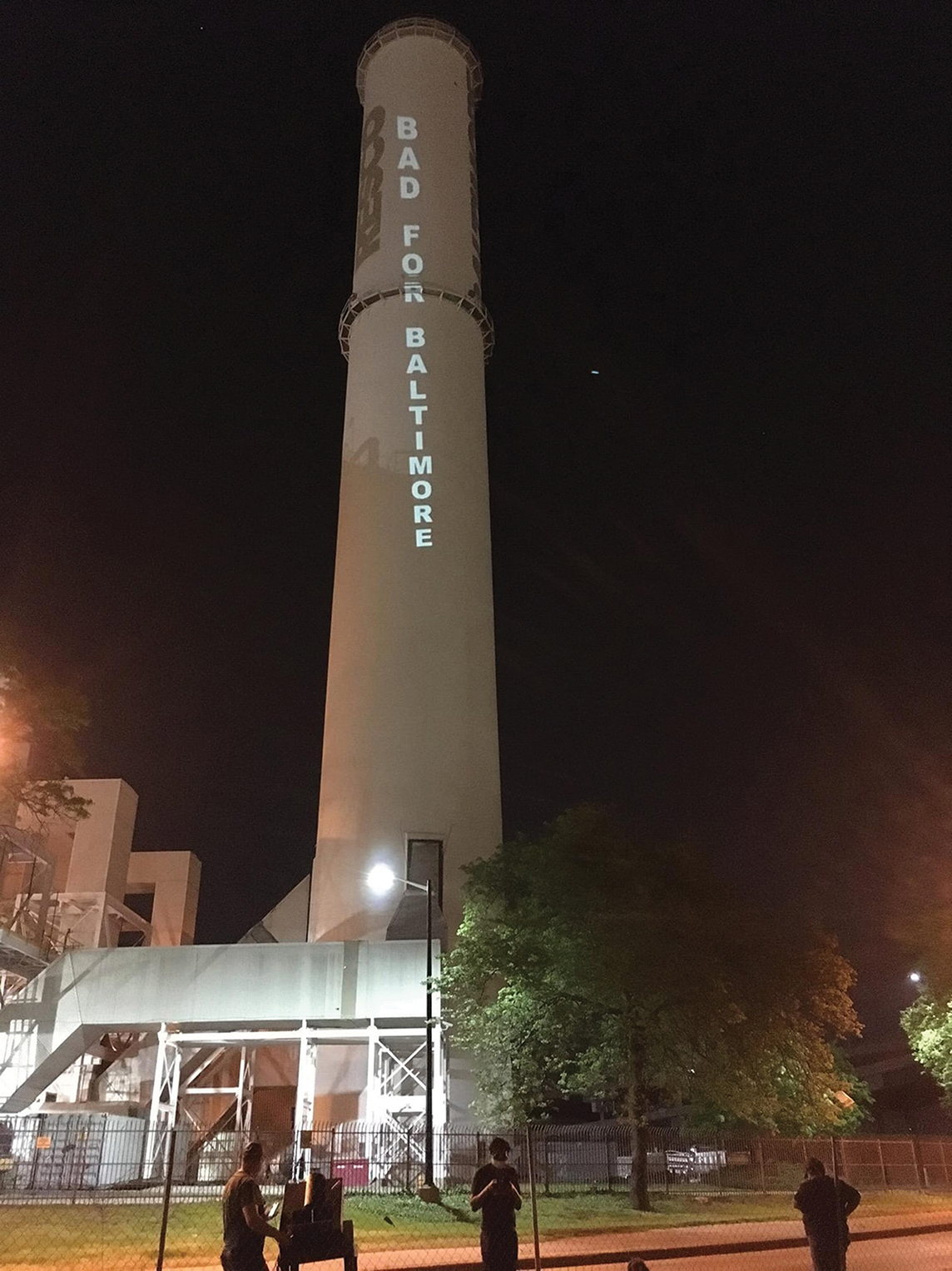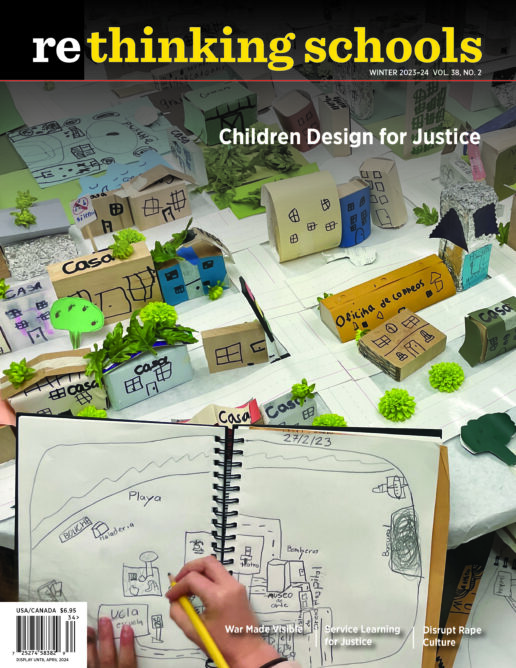Baltimore Students Fight for Climate Justice — and Their Own Lives

We have said it before in the pages of Rethinking Schools: To confront the enormity of climate breakdown, our classrooms will need to nurture millions of students who come to see themselves as climate justice activists. This work can be joyful, playful, “academically rigorous,” grounded in students’ own lives — and effective. One such effort is shown compellingly in a recent episode of the NPR podcast Code Switch: “Student Activists Are Pushing Back Against Big Polluters — and Winning,” hosted with warmth and humor by B.A. Parker and Rebecca Hersher. It’s a story of environmental racism and the teachers and students who fight back, who refuse to accept their neighborhood as a sacrifice zone.
The episode celebrates the inspirational work of Free Your Voice, an after-school student group in South Baltimore’s Benjamin Franklin High School, whose “revolutionary” mission, according to their teacher-adviser Albina Joy, is to lift up students’ everyday experiences — to offer students a space to talk openly about their lives and what matters to them. And one of the key things that matters to students, according to Shashawnda Campbell, a Free Your Voice student founder, is the asthma epidemic in her South Baltimore community:
When we go into the classrooms, 90 percent of the hands go up for asthma. That’s crazy. That’s crazy. We had students sharing pumps. Like, they would share asthma pumps. And that was a normal thing, walking down the hallway like, “OK, I’m going to go to my locker and grab mines,” you know?
Respiratory diseases in her neighborhood were killing more than twice the number of people than in the rest of Baltimore — more people dying from respiratory diseases than from diabetes, strokes, or drug overdoses.
And why? A key source of air pollution in the neighborhood came from a coal export facility, and the coal trains that regularly rolled through the neighborhood, clouds of coal dust blowing into the air. Free Your Voice offered students a space to name and critique what was right in front of them:
We had an open-air coal pile since I was in high school, right? But, like, we all just walk past it because it was like, the best way to hide something is in plain sight, right? Because you normalize it ’cause you grew up with it, you walk past it. And so we started to actually point those things out.
As students named coal dust as a major cause of their community’s health woes, they learned of another company’s plans to build the United States’ largest waste incinerator a mile from their high school. The incinerator would generate electricity — but also spew hundreds of pounds of mercury, lead, and soot into the air they breathed. And diesel-burning trucks that brought trash into the incinerator and took ash out, would add to the community’s toxic haze.
Free Your Voice students went to work, going door to door to explain what was happening — often hearing “you’re so naive if you think you can stop this” comments. Students persisted, organizing marches from the high school to the site of the proposed incinerator. They were at this for years. Eventually, as Campbell recalls, “The same people that told us we were naive, they were like, ‘You’re naive, but I’m going to join in,’ you know?”
And then, along with community activists, students obtained a copy of the contract for the proposed incinerator. Lo and behold, the school district itself had agreed to buy electricity generated by this filthy, trash-burning facility in their own neighborhood.
Students went to the school board to testify, sing, and rap:
If the incinerator takes away a breath,
how many do we need until there was nothing that’s left.
Until the smoke clogs up and we can’t feel our chest.
Ultimately, the school district and other agencies that had agreed to purchase energy from the incinerator project pulled out. The project died. The students won.
Shashawnda Campbell reflected on the power of students’ victory:
That company couldn’t — they couldn’t mess with us. And, you know, we’ve learned a really, really big, big, big message because as a kid, you know, people always tell you, get the best job, make the most money, do this, do that. And so it was us against, like, this company. And so we were like, they have millions of dollars. We have nothing. We’re broke. Like, I don’t even have 50 cents to get a bag of chips right now. So to compare that to this million-dollar company is crazy. And so we’ve learned money wasn’t everything, right? Money couldn’t buy what we had. We had heart. We had community.
That’s a pretty cool lesson for young people to learn. But hard as it was, stopping the proposed incinerator was easier than stopping the massive CSX coal export facility that had been operating there for 100 years.
The second part of the Code Switch podcast focuses on Free Your Voice students’ complicated struggle to stop coal trains from poisoning their neighborhood — and contributing to climate change. More than 8 million tons of coal moved through South Baltimore in 2021. Because of the byzantine laws controlling coal — e.g., the federal government regulates the entry of coal into their neighborhood via train, yet once it arrives, the state regulates the immense piles of coal sitting around waiting for export — the Free Your Voice students needed to become detectives, gathering evidence about the impact of coal in their neighborhood. Students landed on clever ways to collect coal dust samples to send to laboratories around the country. And then they took their results into the community to talk with residents.
NPR climate reporter Rebecca Hersher observed these conversations around coal dust pollution:
It was really inspiring to hear [17-year-old Taysia Thompson] and Ms. Angela [Smothers] talking together about this. Taysia is bringing this knowledge she has from doing research and also the fire that that knowledge has lit in her. And Ms. Angela is bringing her own memories of that place to the table, giving personal context and situating the work that these kids are doing in the longer struggle for clean air here.
Free Your Voice students also took more confrontational direct action, putting up anti-coal banners over freeways, and placing bags of coal on city council members’ doorsteps, with demands to start protecting neighborhoods from coal dust.
The Code Switch podcast does not end neatly in victory for the young people against CSX and its coal dust pollution. The anti-coal struggle in South Baltimore continues — as it does everywhere. Coal remains the most climate-damaging fossil fuel and is responsible for misery around the world. The students in South Baltimore join mountaintop removal activists in West Virginia, anti-coal mining protesters in western Germany, and anti-coal activists throughout India, who have forced the cancellation of two-thirds of proposed mines.
The work of Free Your Voice helps us imagine what education could look like these days. Here, students’ learning is not confined in the traditional disciplinary silos —they learn science, public speaking, scientific inquiry, interviewing, writing, politics, performing arts, how to think strategically. They learn how to hold substantial conversations with elders. They come to see themselves as community problem solvers — people who can make a difference in the world.
As Shashawnda Campbell comes to appreciate how powerful the coal company is, she remarks, “Having the truth does not mean you’re going to win.” She is right. And, yet students have not given up.
We know how horrific the climate catastrophe is — and will become. In our curriculum, we need to lift up stories about organizers who are hopeful, tenacious, defiant. This Code Switch episode offers a glimpse of one such effort.

